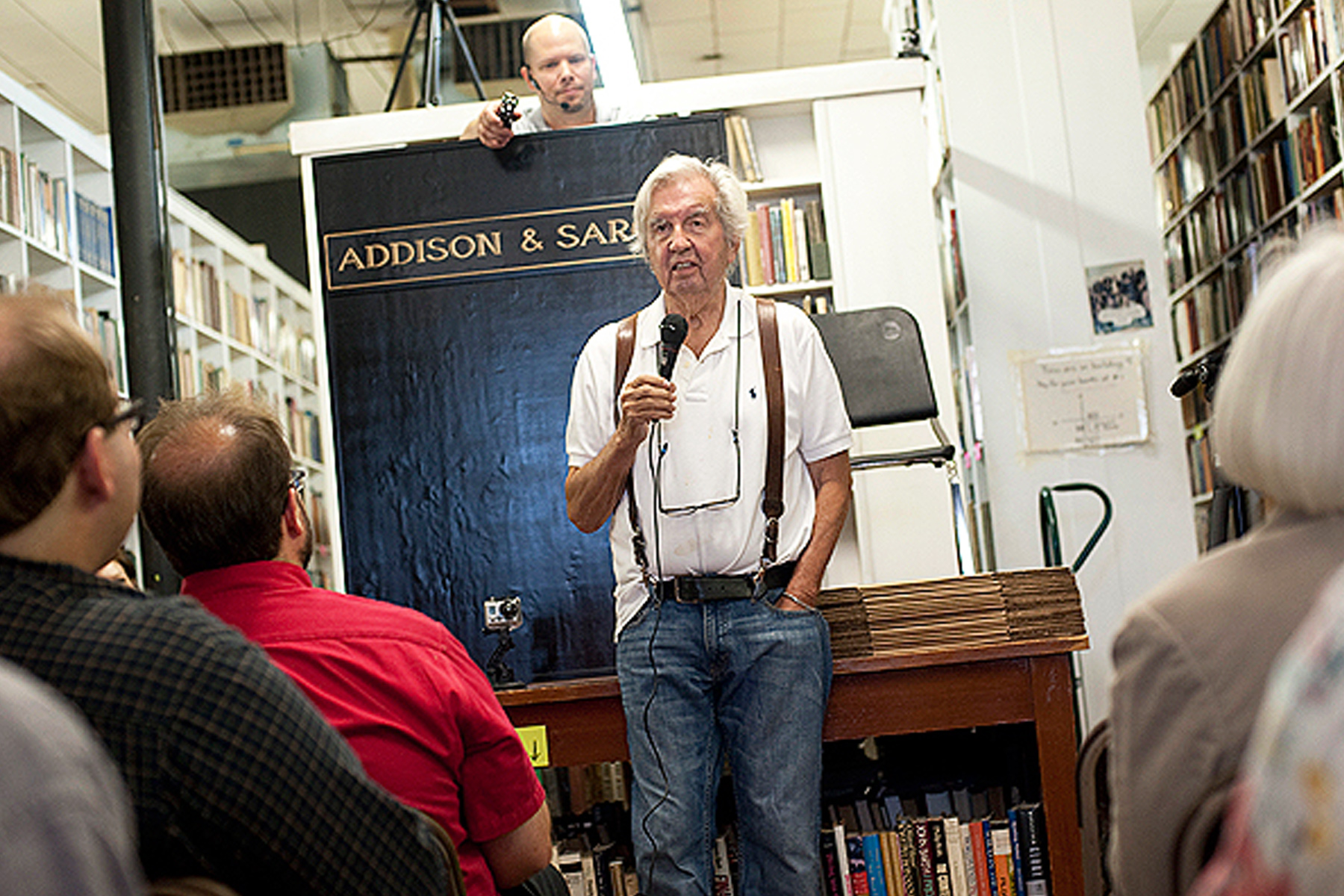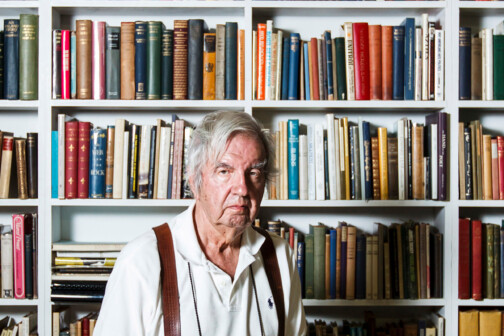A recent collection of essays about the life of Texas literary titan Larry McMurtry paints the author of works like The Last Picture Show and Lonesome Dove in a series of interconnected roles: inspiration, mentor, professor, disaffected cowboy, friend, trailblazer, book collector, curmudgeon, advocate.
More than anything, they depict him as one of the most engaging writers who has ever lived; a man who insisted the milieu that he portrayed (the West) was worthy of depiction, commentary, and enrapturing narrative. To anyone who has read McMurtry, this is undeniably true. His works make you feel, and then they make you think.
Pastures Of The Empty Page was edited by UNT journalism professor George Getschow and published September 5 via University of Texas Press. A series of panels have recently explored McMurtry’s legacy in Texas literature; another will happen at 6 p.m. on Tuesday, January 9, at Interabang Books. Journalist, Axios newsletter reporter, and occasional D scribe Michael J. Mooney will be in conversation with Getschow.
It’s understandable to try and parse McMurtry’s legacy. A more difficult idea to explore is whether McMurtry, who died in 2021, would have liked the book.
There’s an obvious, somewhat superficial, reason the answer might be no. A surly, self-deprecating man who often referred to himself as a “minor regional novelist” for reasons that, the essays point out, are some combination of irony and legitimate self-criticism, McMurtry perhaps would have found such a lengthy endeavor directed at praising him to be a waste of time. Many of the writers of these essays knew McMurtry personally in some capacity and would happily ignore such protests.
But there’s a larger issue at hand with such a compilation. If McMurtry’s works have a single theme, it’s that they so often serve as a request to stop romanticizing and mythologizing ideas simply because they are fading away. There were dangers, in his opinion, in the sentimentality applied to our depictions of the old West. Something in McMurtry’s depicted worlds could be compelling, complicated, humorous, and once cherished, but that didn’t inherently make it good, or in some cases, even necessary to preserve in perpetuity.
Very few of these essays avoid—or even attempt to avoid—falling into pure reverence, not only for McMurtry but for the craft and ambition of writing writ large, using McMurtry as an avatar for a tradition to be seen as universally good and free of bias.
There’s a self-importance hovering over these accounts of connections to the great writer. Some of the essays are caught weaving McMurtry into mythology of their own making.
“For many Texas writers, particularly those of my generation working as soon as they set out in the shadow of his achievements, his career was both intimidating and inspiring,” writes Stephen Harrigan, a novelist and longtime journalist with Texas Monthly.
Skip Hollandsworth begins his essay “I caught my first glimpse of the Lonesome Dove author on the streets of Archer City when I was a kid. It was an encounter that shaped the rest of my life.” He opened a 1991 Texas Monthly story by claiming he “never made it past page 47 of Lonesome Dove.”
Geoff Dyer applauds McMurtry’s prose for not “drawing attention to its own merit” but then he namedrops as he relates that he told Zadie Smith to read Lonesome Dove, an anecdote that contributes little besides her (admittedly snooty) response that she doesn’t like Westerns.
Any event to talk about having a mentor—or just an inspiration—is an opportunity to take the long road toward hinting at, or even outright listing, one’s own accomplishments. These are very accomplished writers writing about an even more accomplished writer, but reading about their bylines and awards won’t provide anyone with even a hint of the richness that the authors of these essays themselves found in McMurtry’s texts as younger people. It is interesting that William Broyles, the founding editor of Texas Monthly, was inspired by McMurtry, but it is also a fact that anyone might have already assumed to be true.
All of this makes you wonder who exactly this book is for, and it walks very close to making it clear that it is exclusively intended to be read by other writers. For any writer who writes because they are drawn by some semi-articulable sense of the craft’s Importance (that is to say, most writers) these essays will provide glimpses and quirks and no-bullshit motivations of a literary giant who, as the book hammers home more than any other point, changed the literary landscape and possibilities for Texas.
Getschow, the book’s editor and an accomplished journalist who headed the Mayborn Literary Nonfiction Conference at the University of North Texas, speaks and writes often of “literary nonfiction.” Using the term implies a sort of elevated form of what would otherwise just be referred to as journalism, but it’s the more fact-focused and less meandering essays in Pastures that provoke the most thought.
Doug J. Swanson, author of Cult of Glory: The Bold and Brutal History of the Texas Rangers, discusses McMurtry’s 1968 criticism of the previous authoritative text on the Rangers, a glowing history by Walter Prescott Webb that treated them only as righteous and brave. “[Webb] records virtually no instance in which a Ranger treats either a Mexican or a Negro as anything but inferior, and he seems to accept the still-common assumption that a Ranger can tell whether a Mexican is honest or dishonest simply by looking at him.”
In his essay, Swanson, as aware of the Rangers’ faults as anyone, points out the ways that McMurtry deflates the idea of their ranks as heroic knights of the Texas plains in Lonesome Dove. In doing so, and in pointing out McMurtry’s disdain for Webb’s telling, Swanson allows the reader to balance McMurtry’s good intentions with the way the Lonesome Dove was received publicly.
Meant to satirize the Western cowboy and the Texas Ranger, McMurtry simply made his writing too compelling and forced his readers to spend too many pages with characters they were not supposed to love. The result is that Gus and Call, two Texas Rangers with questionable morals and levels of competency, are often revered, just as Lonesome Dove is still used as nostalgic inspiration for the old West, most notably by Taylor Sheridan’s hit show Yellowstone and its prequel spin-off 1883.
“Sheridan shunts the ambivalence of Lonesome Dove, at the last moment, into frank colonial sentimentality,” Andrea Long Chu writes in New York Magazine, a development McMurtry surely would not be happy with but likely became used to.
Later, Dallas Morning News reporter Dianne Solis takes McMurtry to task for the stereotyped ways he depicted Mexicans, despite seemingly knowing better.
“Many may excuse such racism on the written page as reflective of the times in which it was penned, but as a writer with Mexican roots, I can’t and I won’t,” Solis says.
For its flaws, Pasture of an Empty Page is still, at the end of the day, fairly addictive. (Full disclosure: I am, obviously, a writer.) The reader gets interesting biographical details about McMurtry’s life and career that are presented in a less formulaic, if more repetitive, way than they would be in an outright biography.
The book shows a man who lived a singular life, provided by way of glimpses into McMurtry’s writing process, his decades as a nearly unparalleled book collection, and the cattle range origins that Getschow highlights in his essay.
Diana Ossana, McMurtry’s 30-year collaborator and co-screenwriter of Brokeback Mountain, wrote a moving essay about their relationship, the origins of their collaborations, and the specifics of McMurtry’s darkest period of depression. Compared to the book’s other essays, the chapter is jarringly personal in its details. Likewise, Mike Evans, a student of McMurtry in 1964, who would go on to marry McMurtry’s ex-wife and play a part in raising his son, James McMurtry, writes of Larry in a way that reflects the intimacy of their relationship.
The hardest part about reading Pastures of the Empty Page is never getting to read McMurtry in its pages. Instead, he is the subject of writers plenty capable of stirring something in a reader, so capable that someone reading this collection who has never actually read McMurtry must think that his writing is literal magic, able to do something even more powerful than any of these essays could.
They would not necessarily be wrong.
Author







